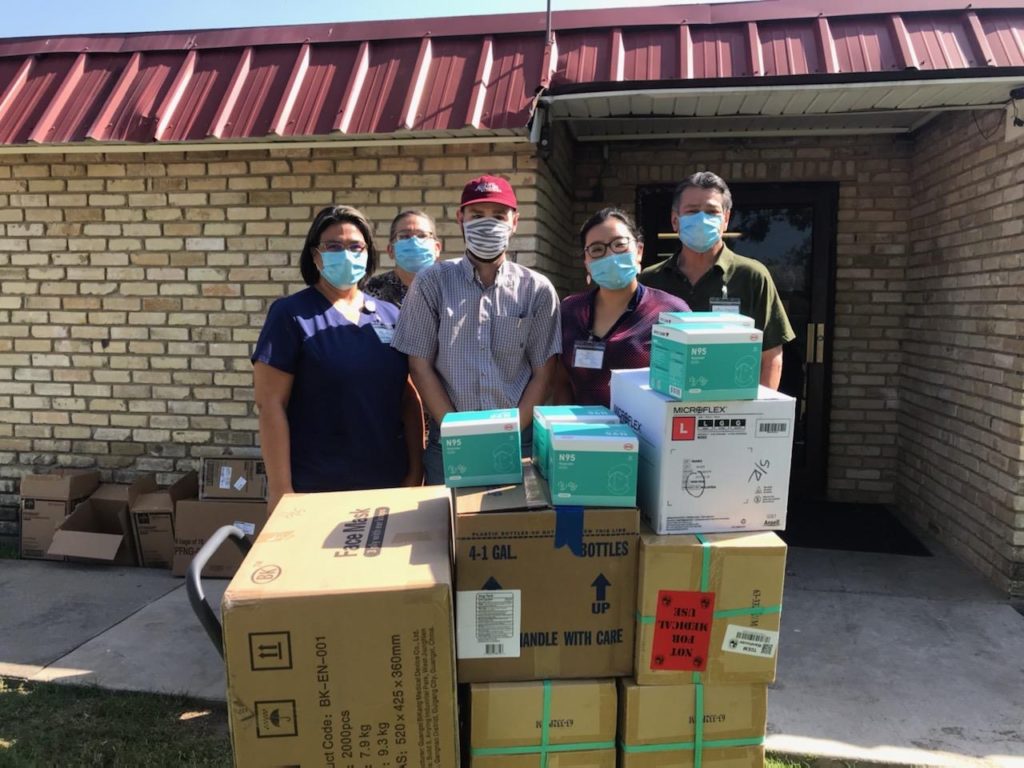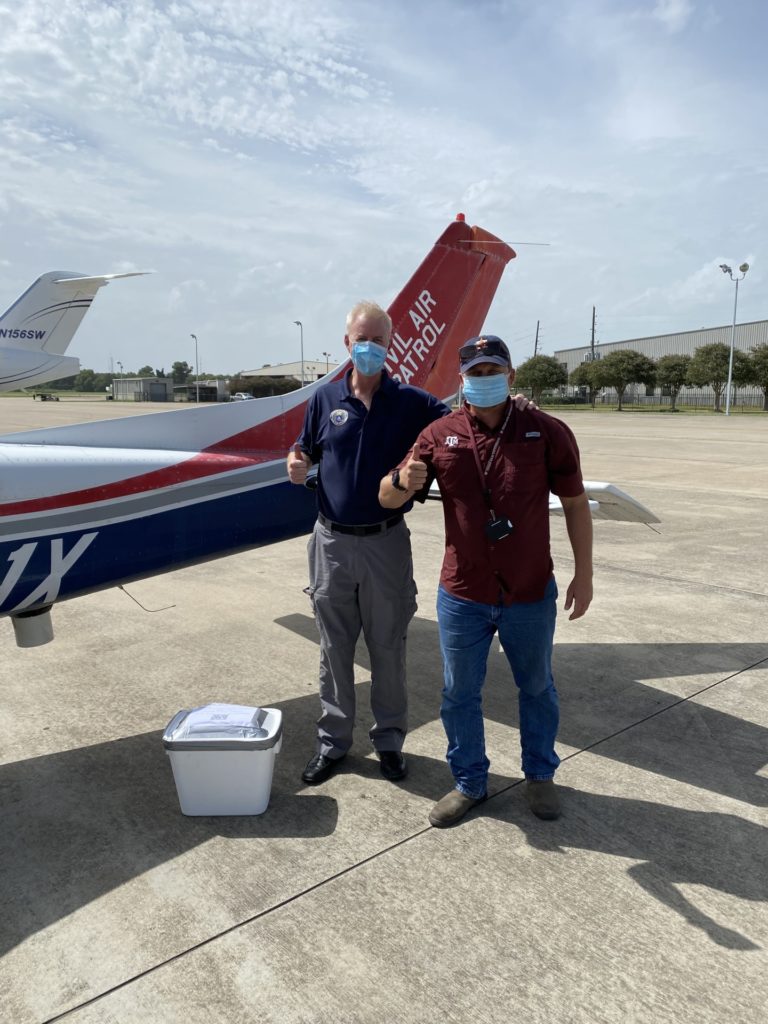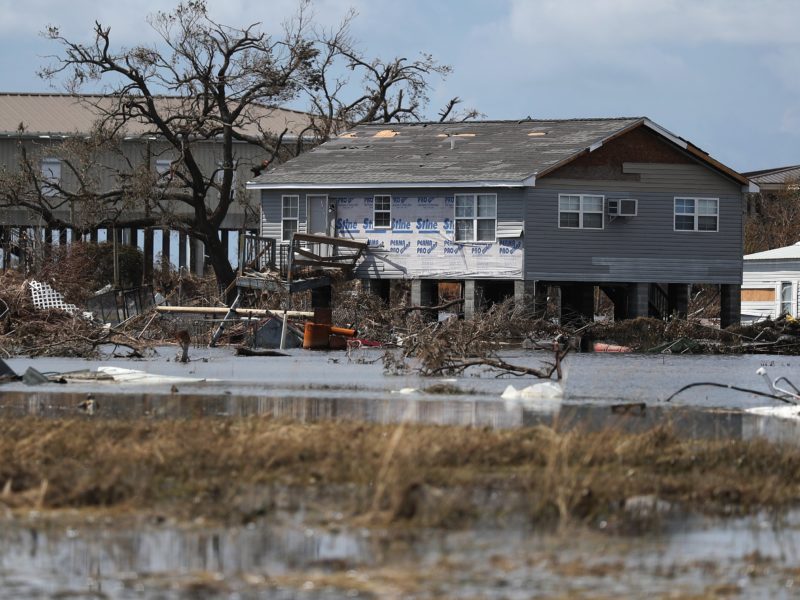Special group of AgriLife Extension agents responds when disaster strikes
Disaster Assessment and Recovery team supports long-term COVID-19, other emergency recovery efforts
Many Texas A&M AgriLife Extension Service employees statewide answered the call when a wide range of efforts related to disaster recovery during the COVID-19 pandemic, Hurricane Laura and Winter Storm Uri were needed in the past year.

“Throughout the pandemic, AgriLife Extension personnel from around the state have been assisting in the COVID-19 recovery response by distributing medical supplies, personal protective equipment and vaccines, delivering test kits, supporting animal sheltering efforts and providing a variety of additional support services,” said Monty Dozier, Ph.D., director of AgriLife Extension’s Disaster Assessment and Recovery, or DAR, unit. “Their dedication and commitment to serving the people of Texas and beyond during this time has been exceptional.”
A statewide approach to disaster response
Dozier said among those AgriLife Extension personnel dedicated to COVID-19 recovery are 19 DAR agents who have been deployed throughout the state, some since shortly after the pandemic began.
“Those 19 people have been deployed anywhere from several months to more than 400 days, providing onsite support in the areas of the state where they were most needed,” Dozier said. “Nine of those DAR team members were former military, so they had previous experience with deployments and adapting to unusual or difficult circumstances.”
The DAR team supports the response efforts of the Texas A&M Engineering Extension Service, TEEX, and the Texas Division of Emergency Management, TDEM, as well as state and national emergency management agencies.
DAR team members and AgriLife Extension agents, specialists, regional program leaders and district administrators were sent to locations throughout the state where the TDEM and Texas Department of State Health Services, DSHS, established Regional Staging Areas, RSAs, for medical supply distribution.
RSAs were set up in all 11 DSHS regions. Staging areas were located in Dallas, Houston, San Antonio, Austin, El Paso, Corpus Christi, Lubbock, Midland, Lufkin, McAllen and Tyler.
At these staging areas, AgriLife Extension responders helped with inventory, packaging, repackaging and distribution of supplies. Among the items they helped inventory and distribute statewide were personal protective equipment such as gloves, gowns, face masks and shields, COVID test kits, ventilators and other medical supplies.
A new take on the Pony Express
DAR team members and other AgriLife Extension personnel were also involved in what was dubbed the “Pony Express” aspect of supply fulfillment, said Rachel Bauer, AgriLife Extension liaison to the Texas State Operations Center in Austin.
“If a health care facility or frontline operation made a request to TDEM for items related to COVID-19 relief, we made sure that order was fulfilled expeditiously,” Bauer said. “Most of these were State of Texas Assistance Requests funneled to TEEX personnel and DAR agents who coordinated or were involved in their fulfillment.”

Bauer said Pony Express efforts were also supported by TDEM, Texas Department of Public Safety, Emergency Medical Task Force, Civil Air Patrol and Texas Parks and Wildlife.
“Trucks, small and large vans, box trucks and small planes were all used to pick up or deliver personal protective equipment, new COVID-19 test kits, used test kits needing analysis, vaccines and a variety of other necessary items,” Bauer said. “Thousands of pick-ups and deliveries have been made by Pony Express during the pandemic, and this effort will continue until it is no longer needed. The DAR agents and county agents have been a major part of this effort.”
Raylene Pennington, DAR agent based at AgriLife Extension’s office in Stephenville and currently working from the agency office in Glen Rose, said her most vivid memory of the pandemic was making a delivery to a nursing facility.
“I can’t remember exactly what town it was, but what I do remember is that I was met by a group of people wearing biohazard suits,” she said. “They all looked exhausted and were so grateful for the supply of personal protective equipment we brought them. You could see they had been stretched to the limit and couldn’t even spare someone to go get supplies.”
Trouble never comes alone
Pandemic-related efforts did not stop DAR agents from accomplishing their overall mission, which is to help Texans during emergencies, Dozier said.
“DAR team members lend community support and assistance during hurricanes, floods, freezing weather and other natural disasters,” Dozier said. “They are among the first in our agency to leave and among the last to return when responding to a disaster or emergency.”

Jeff Fant, DAR agent based in San Angelo who has been working at the staging area in Midland for more than 400 days, said the team is used to responding to multiple disasters within a calendar year.
Fant was asked to assist with assessment and recovery efforts after Hurricane Laura made landfall in August. The storm caused more than 40 deaths and an estimated $19 billion in damages to southwestern Louisiana and southeastern Texas.
“We went boots on the ground in Orange County and covered that county and surrounding counties, including just about every logging road in the rural areas, assessing damage,” he said. “We expected to it to take 10-14 days, but we were able to assess the damage in Orange, Salinas and Jasper counties in less than five days and then we returned to our COVID-19 support duties.”
Another DAR agent, Will Stevens, based in Webster and assigned to Lufkin for COVID-19 duty, volunteered to take a shipment of blankets to a homeless shelter in Houston during Winter Storm Uri in February.
“When I heard they needed blankets, I volunteered to go right away,” he said. “The roads were icy and slippery, but we finally got there safely. It really made my day to know that this delivery was able to help those people stay warm in those freezing temperatures.”
DAR and other agency personnel including Curtis Preston, DAR agent based in Lubbock and currently working from the AgriLife Extension office in Muleshoe, assisted with disasters inside and outside Texas.
During the pandemic, Preston traveled to northern California to assist animal sheltering efforts after wildfires swept through that area.
“I was asked to serve as lead for animal sheltering activities in that area,” Preston said. “This involved a variety of animals, especially horses. We also sheltered sheep, donkeys, guineas and chickens. Since so much of the disaster assistance in California is through volunteers, I also coordinated volunteer activities. This was also something I already knew how to do because so many of the programs I’ve been involved with at AgriLife Extension are also supported by volunteers.”
A force for good
Dozier said one of the greatest benefits of working with agency personnel and collaborating with other entities during the pandemic has been in developing successful working relationships that can be reactivated in the event of a future disaster or emergency.
“This pandemic has been a challenge, but it has also revealed a lot about the resourcefulness, caring and resilience of the people of Texas,” he said. “Our director, Dr. Jeff Hyde, has said on many occasions that he wants our agency to serve our fellow Texans and be a force for good. I hope we have done those things during this difficult time for our state and country.”


